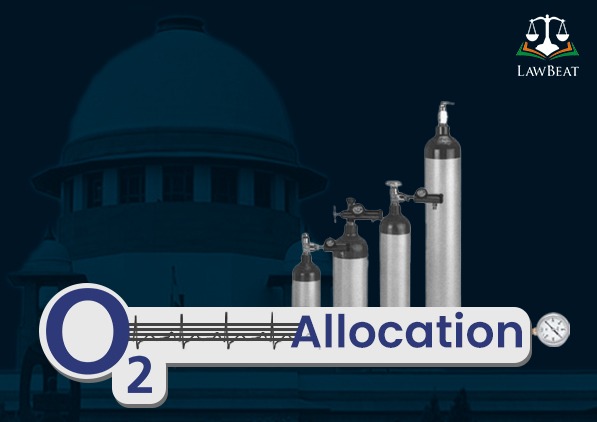GOI’s pro-active steps during first wave helped amp up O2 supply during second wave: Supreme Court audit panel

On the direction of the Supreme Court of India in an order dated 6th, May 2021 to constitute a “National Task Force”, to ensure streamlining of oxygen distribution across the country, Ministry of Health & Family Welfare filed an affidavit that mentioned the recommendations and steps taken for the same.
The Additional Secretary/authorized signatory of the petitioner Mr. Nipun Vinayak has filed the present affidavit. He stated in the affidavit that, “a majority of the recommendations given by the National Task Force on oxygen were already being implemented by the Central Government as mentioned in the Report itself and the Central Government is working on other recommendations.”
The task force said in its report that proactive steps were initiated by Government of India when the first wave of the pandemic hit the country & that it was these steps that quickly helped putting in place mechanisms for production when the second wave came with force.
The National Task Force (NTF) was constituted in pursuance of the orders of the Hon’ble Supreme Court dated 6 May 2021 in SLP (Civil) no 11622/2021, and regular meetings were held from 9th May, 2021 onwards.
RECOMMENDATIONS OF THE NATIONAL TASK FORCE
1: Assess and make recommendations for the entire country based on the need for, availability and distribution of medical oxygen.
2: Formulate and devise the methodology for the allocation of medical oxygen to the States and UTs on a scientific, rational and equitable basis.
3: Make recommendations on augmenting the available supplies of oxygen based on present and projected demands likely during the pandemic.
4: Make recommendations for the periodical review and revision of allocations based on the stage and impact of the pandemic.
5: Facilitate audits by sub-groups within each State and UT inter alia for determining:
a) whether the supplies allocated by the Union Government reach the concerned State/UT;
b) the efficacy of the distribution networks in distributing supplies meant for hospitals, health care institutions and others;
c) whether the available stocks are being distributed on the basis of an effective, transparent and professional mechanism; and d) accountability in regard to the utilisation of the supplies of oxygen allocated to each State/UT.
The recommendations of the NTF can be classified into measures to be taken at the level of
- the hospitals, such as oxygen audit, cleaning of the pipelines, triage system for patients, etc;
- the states, such as tracking of tankers, creating alert system for hospitals, war room at state level for real time tracking systems, reports by oxygen audit committees, etc;
- at Central level, such as procurement of cylinders, enhancing production and supply of oxygen, mapping oxygen for states as per formula that includes case load, infrastructure of beds, projected requirements, etc, and the need for a supply plan which is also dynamic and flexible.
Background:
Earlier, a bench of Justices DY Chandrachud & MR Shah noted that a consensus had emerged that there was a need to ensure allotments of medical oxygen to the States and UTs on a scientific, rational and equitable basis, upon submissions adverted to at behest of the Solicitor General of India.
It had been directed that establishment of the Task Force will provide the Union Government with inputs and strategies for meeting the challenges of the pandemic on a transparent and professional basis, in the present and in future.
The court had also stipulated an elaborated terms of reference which can be modulated subsequently as and when the need may arise, which included assessing and making recommendations for the entire country based on needs, availability and distribution of medical oxygen and formulating and devising a methodology for allocation of medical oxygen in the country apart from reviewing and suggesting measures necessary for ensuring the availability of essential drugs and medicines etc.
The 12 panel members who have been appointed by the Court upon suggestions given by the Union are:
1. Dr Bhabatosh Biswas, former Vice-Chancellor, West Bengal University of Health Sciences, Kolkata
2. Dr Devender Singh Rana, Chairperson, Board of Management, Sir Ganga Ram Hospital, Delhi
3. Dr Devi Prasad Shetty, Chairperson and Executive Director, Narayana Healthcare, Bengaluru
4. Dr Gagandeep Kang, Professor, Christian Medical College, Vellore, Tamil Nadu
5. Dr JV Peter, Director, Christian Medical College, Vellore, Tamil Nadu
6. Dr Naresh Trehan, Chairperson and Managing Director, Medanta Hospital and Heart Institute, Gurugram
7. Dr Rahul Pandit, Director, Critical Care Medicine and ICU, Fortis Hospital, Mulund (Mumbai, Maharashtra) and Kalyan (Maharashtra)
8. Dr Saumitra Rawat, Chairman and Head, Department of Surgical Gastroenterology and Liver Transplant, Sir Ganga Ram Hospital, Delhi
9. Dr Shiv Kumar Sarin, Senior Professor and Head of Department of Hepatology, Director, Institute of Liver and Biliary Science (ILBS), Delhi
10. Dr Zarir F Udwadia, Consultant Chest Physician, Hinduja Hospital, Breach Candy Hospital and Parsee General Hospital, Mumbai
11. Secretary, Ministry of Health and Family Welfare, Government of India (ex officio member); and
12. The Convenor of the National Task Force, who shall also be a member, will be the Cabinet Secretary to the Union Government.
